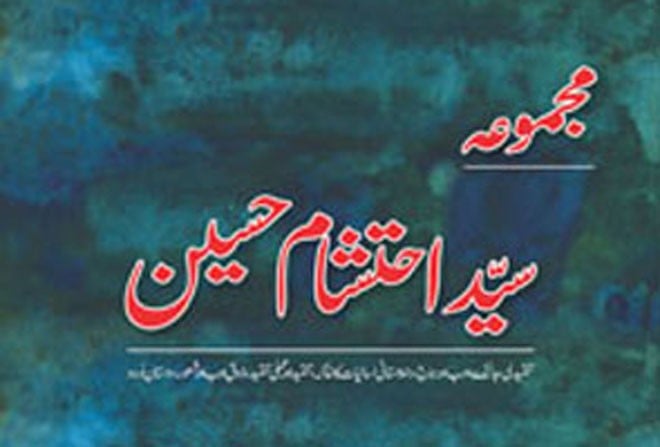
With a rich treasure of archival material at his disposal, Ahmad Salim has compiled ten books of Ehtisham Husain in two thick volumes

Ahmad Salim is an indefatigable researcher who does not like to sit idle. Every once in a while, he comes up with a new idea and that’s how the readers get to see new titles on diverse subjects compiled and edited by him. The list of the books that he has compiled or edited is too long to discuss here.
For many years, he was inclined towards the progressive writers, critics and their works. But he noted that many writers were absent from the literary scene due to the non-availability of their books. Hardly any debate or serious discussion was possible in these circumstances. This was a constraint for Urdu readers and scholars as there wasn’t much left to discuss on a certain writer or critic.
Ehtisham Husain was a great critic belonging to progressive and Marxist school of thought, a prolific writer who had penned many books, but only one or two of his books got published in Pakistan. Ahmad Salim wanted to mark the 100th birth anniversary (2012) of the esteemed critic by piecing together his books. But it didn’t materialise as there weren’t many published here in Pakistan.
Now, with a rich treasure of archival material at his disposal, Ahmad Salim has been successful in compiling ten books of Ehtisham Husain in two thick volumes.
The readers and scholars of Urdu literature should welcome the two volumes devoted to Husain as now they will be in a better position to unravel his critical worth and relevance. Born in Azamgarh (UP) in 1912, he was schooled in his native town and later went to Allahabad for further studies. In 1938, he started his illustrious career as a lecturer in Urdu at Lucknow University and there was no looking back.
Until his death in 1972, he continued to enrich Urdu criticism with his output as he wrote many books on various topics. Initially it was Urdu short story that captured his imagination and Weeranay was the name of his short stories collection which sadly is not included in these two volumes as Ahmad Salim notes that he couldn’t lay his hands on it. But he intends to publish the rest of the books in the coming volumes that he plans to bring out very soon.
But even with these two volumes, any serious reader and scholar can gauge his standing. It should also be kept in mind that he was deeply influenced by Marxist ideology and considered literature a sort of tool to judge the aspirations of the people. Generally, such ideological writings tend to be repetitive and boring. These take those writers to task who refuse to become prisoner of any dogmatic ideology. They even made scathing attacks on Saadat Hasan Manto as they thought he didn’t toe the party line.
Ehtisham Husain was also accused of sacrificing the aesthetics at the cost of his ideological inclinations. Critic Khalilur Rehman Azmi was of the view that at times one felt that writing criticism wasn’t his aim; rather he was in search of the material to solve the political and social problems of India.
Now that so much time has flown down the literary stream, it would be only proper to have a fresh look at the writings of Ehtisham Hussain. The important question is: how can the present readers and scholars relate with these writings. After taking a detailed look into these ten books in these two volumes will one be able to do full justice to Ehtisham Husain who is beyond doubt a pillar of Progressive Writers Movement and the ideology it vouched for.
One could disagree with him on ideological grounds but one has to laud the prose which is quite readable. In these pages you will find him discussing the finer points of art, literature, drama, Hindustani classic literature and linguistics and countless other articles. The first volume contains his six books: Tanqidi Jaizay, Adab Aur Samaj, Hindustani Lisaniat Ka Khaka, Tanqid Aur Amli Tanqid, Zauqe Adab Aur Shaoor and Dastan e Urdu. Volume two contains Aks Aur Ainay, Urdu Lisaniat Ka Mukhtasir Khaka, Jadeed Adab, Urdu Adab Ki Tanqidi Tareekh’. Tanqidi Nazriat, a collection of critical essays of various scholars, compiled by Ehtisham Husain, has also been added to the same volume.